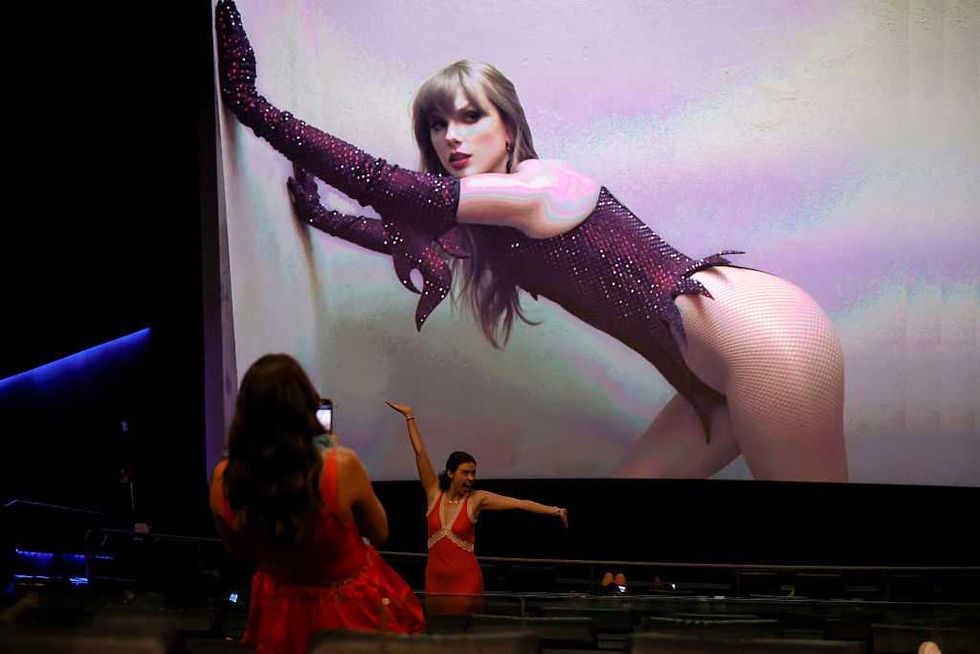Satan has a mix tape — and Taylor Swift is on the playlist


Taylor Swift is back with a new record, and with her return come the old accusations.
Live Your Best Retirement
Fun • Funds • Fitness • Freedom
For years, people have suggested that she hides strange symbols in her songs and videos. Even other pop stars have said the same thing — and they’re not wrong. From the serpent motif that slithered through her "Reputation" era to the witchy forest rituals of "Willow" and the tarot-like imagery of "Midnights," Swift has long played with the language of mysticism.
What faith once offered in family and devotion, the industry now mimics through sexualization and self-display.
It’s seductive, deliberate, and deeply disturbing.
Rock once wore its rebellion openly. Ozzy Osbourne feasted on bats. Led Zeppelin flirted with the occult. Alice Cooper strutted across stages like the devil in drag. But pop is subtler, sweeter — and far more dangerous. Rock shouted “Hell!” for the shock of it. Pop smiles, takes your hand, and leads you there.
Billie Eilish, the Beetlejuice of pop, floats through a fog of depression, her music drowning in melancholy: songs about mutilation, numbness, and detachment from reality. Lil Nas X, a raving homosexual who seems to revel in depravity, enjoys grinding on Satan. Doja Cat smears herself in blood and calls it expression.
None of this is random. The industry has learned that darkness sells because emptiness is a vacuum that needs to be filled. Rhythm reaches where reason can’t, and belief can be rewritten one beat at a time.
Unfortunately, no audience is more vulnerable than young girls.
They listen on repeat, absorbing lyrics like liturgy. Pop has always known how to reach them. In the 1960s, the Beatles sang of love as liberation. By the 1980s, Madonna turned it into a marketing campaign. Britney Spears wore innocence like a costume, then tore it off — literally and figuratively — knives in hand. There is something unmistakably demonic in her descent, a possession of the spirit that fame so often brings.
The same story repeats itself across the pop pantheon.
Once the cherubic choirboy of global pop, Justin Bieber now fluctuates between repentance and relapse, his body scarred by tattoos and abuse. There’s also Miley Cyrus, Demi Lovato, Katy Perry, and Ariana Grande, each one a pathetic version of their former selves.
The pop idol is no longer a musician but a model for imitation. The results are visible: depression, anxiety, disordered eating, and a generation that sings about love but cannot define it or identify it. Young people are raised on a rotation of heartbreak and hedonism, told to celebrate the very things that destroy them.
Pop today preaches a gospel of transaction. Every desire is for sale. Love is no longer a covenant but a contract. Sex is not intimacy but advertisement. Artists sing about bodies the way brokers talk about stocks — measured in clicks, hype, and fleeting returns.
The message is clear: Everything is currency, even the body.
RELATED: Taylor Swift's 'Life of a Showgirl': The same sad sound and fury
 Frazer Harrison/Getty Images
Frazer Harrison/Getty Images
What began as entertainment has evolved into indoctrination. The language of romance has been replaced by the “logic” of the marketplace. Pleasure is product, people are platforms, and purity is just another brand to discard once it stops selling. The line between pop music and OnlyFans is straighter than most want to admit. Both peddle illusion — connection without commitment, desire without depth.
What faith once offered in family and devotion, the industry now mimics through sexualization and self-display. The result is a culture fluent in indulgence, obsessed with pleasure but ignorant of purity. What once pointed upward now drags us down. The language of heaven has been rewritten in the dialect of hell.
Even the visuals echo it. Neon crosses. Angel wings stitched from latex. Horns hidden beneath halos. The symbolism, evident to anyone with functioning vision, is always dismissed as “art.” But art without virtue stops telling the truth and starts selling the lie. And history reminds us that deception has always been the devil’s favorite instrument.
Pop’s greatest trick is pretending it’s harmless. Rock scared parents into vigilance. Pop lulls them into complacency. It sounds innocent enough, but beneath the cute choruses lies the same poison. When every song preaches self-worship, when every lyric mocks modesty, when every beat celebrates bondage, the playlist becomes a pilgrimage into perdition.
The industry calls it entertainment. But look closer and you’ll see a darker design: music that numbs, not nourishes, and beats that bind, not liberate.
It’s no accident that the idols of this age are called “idols.”
Tens of millions stream them, worship them, and defend them with evangelical ecstasy. They shape the moral mood of the young more than any preacher ever could. And yet while they sell songs about love and light, the world they create grows darker by the day. Broken homes. Hookup culture. Teenage pregnancies. Gender confusion. Isolation and self-harm. Faith mocked. Fatherhood maligned. Motherhood treated as an outdated inconvenience.
The irony is that Swift and several other artists were raised in the church. They know the cadence of a hymn, the thrill of a crowd, the longing for transcendence. They just redirected it. The altar became a stage, and the worship didn’t stop but changed direction.
But here's the truth: Mocking religion is a poor substitute for meaning. You can dance in devil horns for only so long before realizing there’s nothing on the other side of derision and disdain. No culture that mocks the sacred can remain strong.
The industry calls it entertainment. But look closer and you’ll see a darker design: music that numbs, not nourishes, and beats that bind, not liberate. The melodies are catchy because the message must be smuggled in softly. That’s the genius — and the evil — of pop music.
And so we arrive where we began. Taylor Swift has released another record. Millions have listened. But few have stopped to wonder what’s being worshipped.
Satan no longer hides in the dark. He performs under a spotlight.
Originally Published at Daily Wire, Daily Signal, or The Blaze
What's Your Reaction?
 Like
0
Like
0
 Dislike
0
Dislike
0
 Love
0
Love
0
 Funny
0
Funny
0
 Angry
0
Angry
0
 Sad
0
Sad
0
 Wow
0
Wow
0













































































